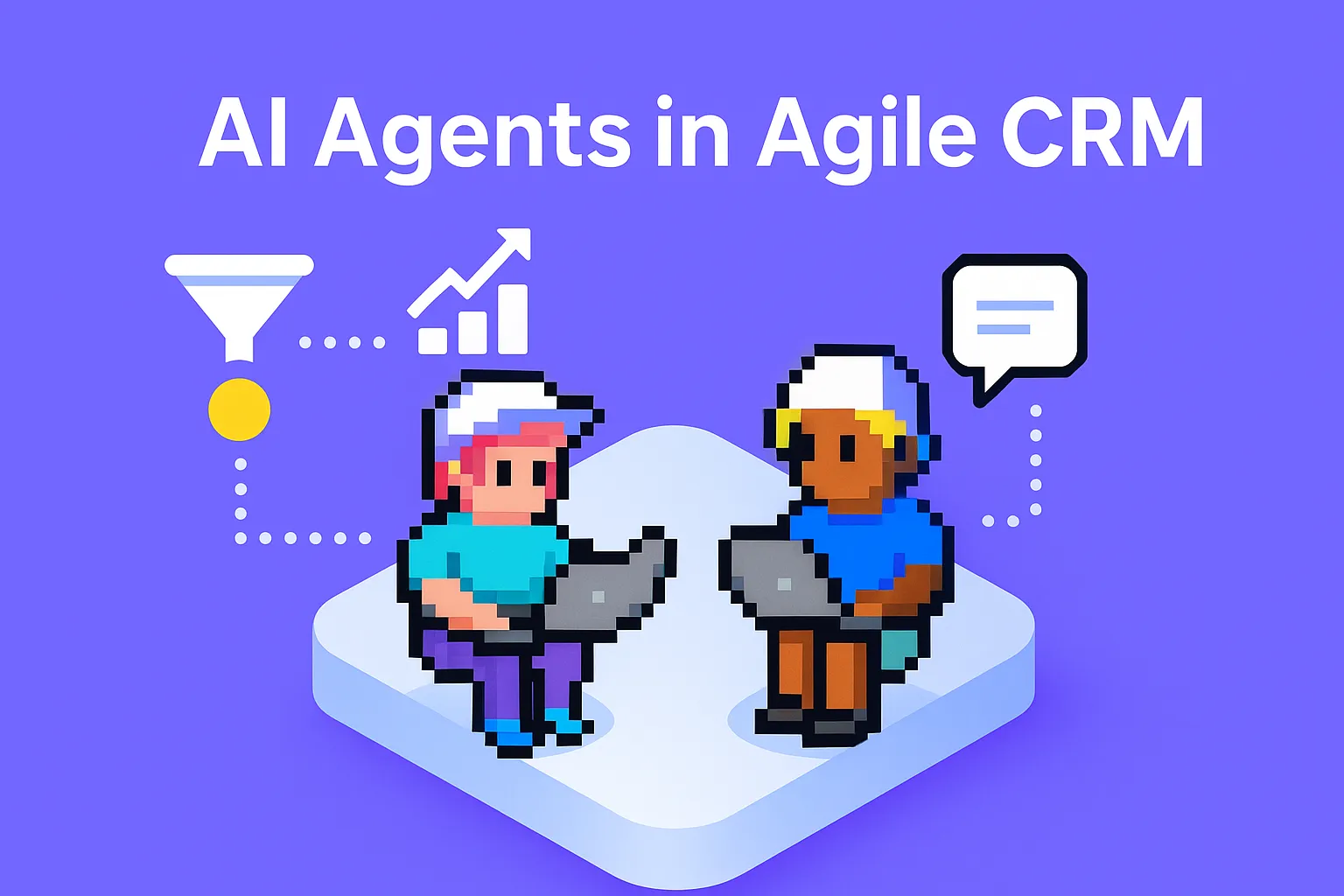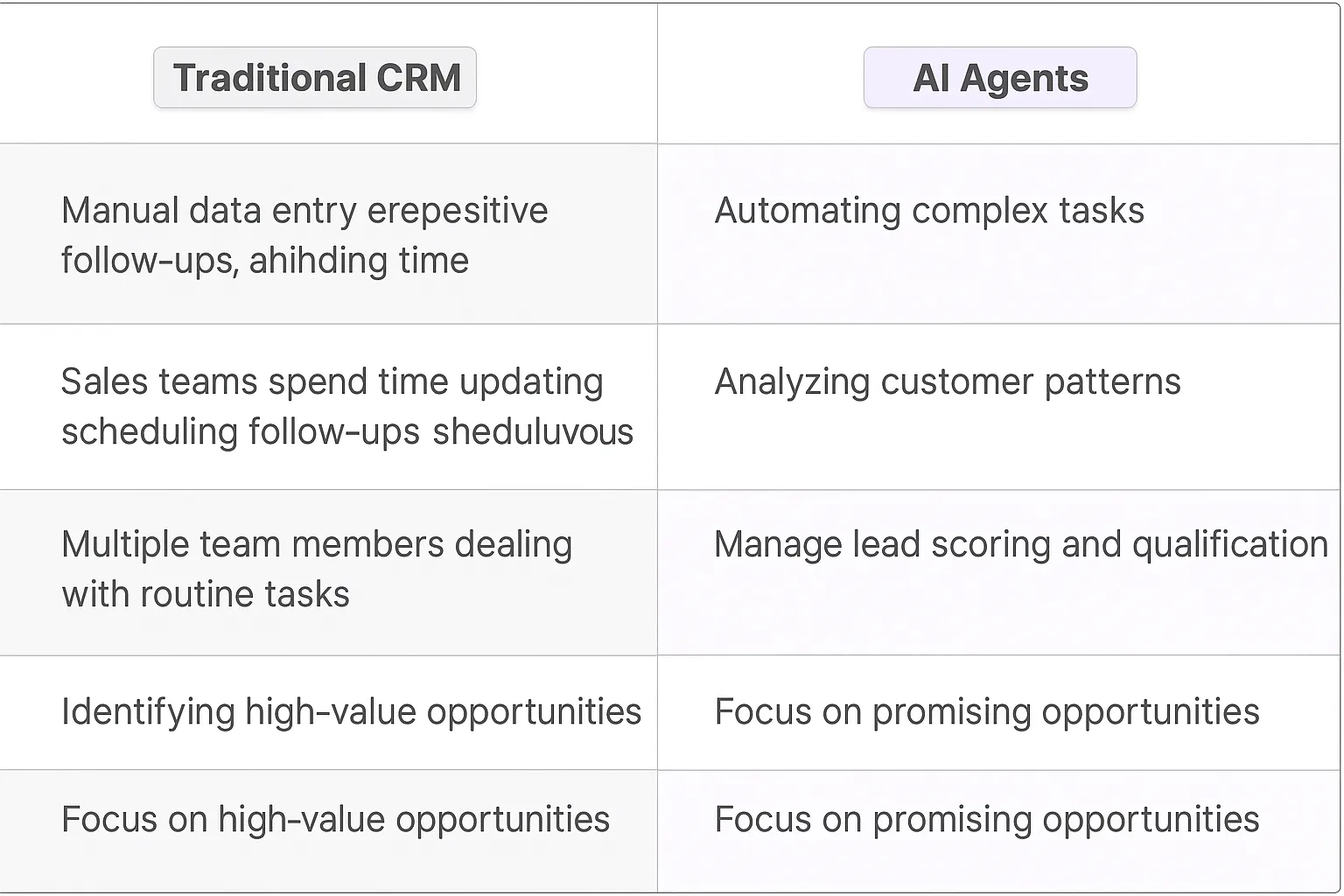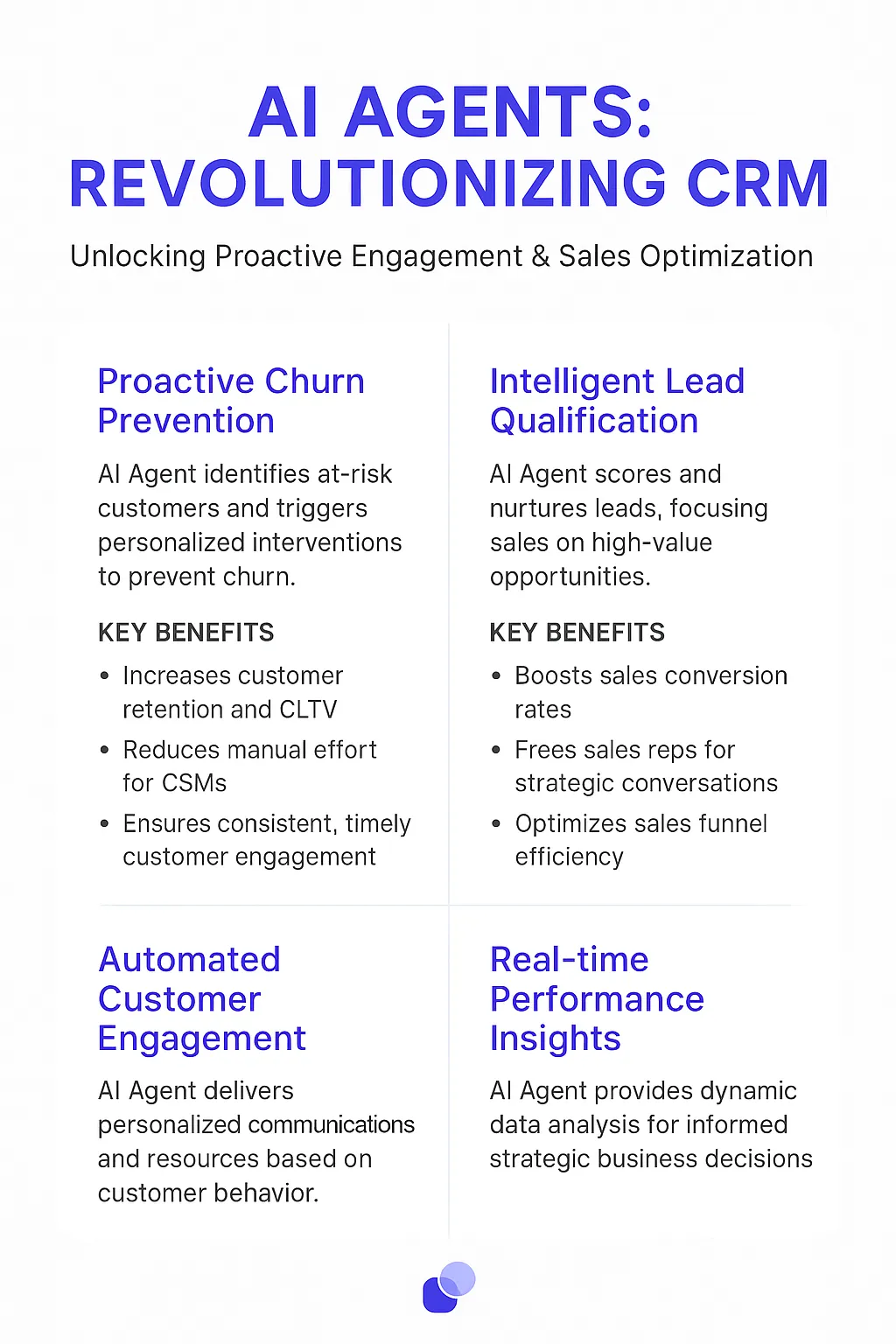Agile CRM
Understanding Agile CRM's Core Platform
Agile CRM stands as a comprehensive customer relationship management platform that combines sales, marketing, and service capabilities into a unified system. The platform emphasizes flexibility and scalability, allowing businesses to manage customer interactions across multiple channels while maintaining a single source of truth for customer data.
Key Features of Agile CRM
- Contact management with 360-degree customer views
- Sales automation and pipeline management
- Marketing campaign orchestration
- Customer service and helpdesk functionality
- Project management capabilities
- Advanced reporting and analytics
- Integration capabilities with popular business tools

Benefits of AI Agents for Agile CRM
What would have been used before AI Agents?
Traditional CRM workflows relied heavily on manual data entry, repetitive follow-ups, and time-consuming customer segmentation. Sales teams spent countless hours updating contact records, scheduling follow-ups, and trying to identify high-value opportunities in their pipeline. The standard approach involved multiple team members dedicating significant time to routine tasks like logging calls, categorizing leads, and maintaining customer communication histories.
What are the benefits of AI Agents?
AI Agents transform Agile CRM into a significantly more powerful system by handling complex tasks that previously required extensive human intervention. These digital teammates can automatically analyze customer interaction patterns and identify behavioral signals that indicate sales readiness - something that would take human analysts days or weeks to uncover.
The real game-changer is how AI Agents manage lead scoring and qualification. They continuously process vast amounts of customer data, identifying subtle patterns in engagement levels, website visits, email responses, and social media interactions. This deep analysis helps sales teams focus their energy on the most promising opportunities.
For customer support, AI Agents excel at proactive engagement. They can detect when customers might be experiencing issues based on their usage patterns and trigger personalized interventions before problems escalate. This predictive approach to customer success has shown to reduce churn rates by up to 25% in early adopter organizations.
The automation of routine tasks like data entry and basic customer inquiries frees up human team members to focus on high-value activities that require emotional intelligence and complex problem-solving. Sales representatives can spend more time building relationships and closing deals rather than managing administrative tasks.
Perhaps most importantly, AI Agents bring consistency to CRM processes. They ensure that no customer interaction falls through the cracks and that follow-ups happen at optimal times. This level of reliability and precision in customer relationship management was simply not achievable with traditional manual processes.

Potential Use Cases of AI Agents with Agile CRM
Processes
AI Agents transform how teams interact with Agile CRM by handling complex, multi-step processes that traditionally required significant manual effort. The agents can orchestrate lead nurturing sequences, automatically adjusting communication cadence based on prospect engagement signals. They monitor deal pipelines and proactively flag opportunities that need attention, while simultaneously updating contact records with fresh data from various touchpoints.
When integrated with sales workflows, these digital teammates analyze historical deal patterns to suggest optimal next steps for each prospect. They can automatically segment contacts based on behavioral patterns and engagement metrics, creating dynamic lists that evolve as customer interactions change.
Tasks
The granular task execution capabilities of AI Agents in Agile CRM deliver significant value across daily operations. These digital teammates excel at:
- Drafting personalized follow-up emails based on previous conversations and contact history
- Scheduling and rescheduling meetings while maintaining context from past interactions
- Enriching contact profiles by pulling relevant information from social media and other public sources
- Creating detailed call summaries and extracting action items from sales conversations
- Generating customized proposals using historical deal data and current pricing parameters
- Building targeted customer segments based on complex criteria and behavior patterns
- Monitoring customer health scores and flagging accounts needing intervention
- Analyzing win/loss patterns and providing tactical recommendations for similar opportunities
The real power emerges when these AI Agents handle the cognitive load of CRM maintenance, allowing sales teams to focus on relationship building and deal closing. By managing data quality and maintaining up-to-date records, they create a foundation of reliable information that drives better decision-making across the organization.
Growth teams particularly benefit from the agents' ability to identify patterns in customer behavior and engagement, enabling more precise targeting and personalization at scale. This combination of automation and intelligence transforms Agile CRM from a simple database into a dynamic system that actively contributes to revenue generation.

Industry Use Cases
AI agents are transforming how sales teams and customer success teams operate within CRM systems. The integration of AI into Agile CRM creates powerful new capabilities that go far beyond basic automation. Sales teams at high-growth companies are discovering that AI agents can analyze customer interaction patterns, predict buying signals, and proactively suggest next best actions.
Looking at specific industry applications, we're seeing manufacturing firms use AI agents to track complex sales cycles involving multiple stakeholders and long decision timelines. Their digital teammates monitor customer touchpoints, flag potential roadblocks, and maintain engagement through personalized outreach - all while keeping the CRM data pristine and actionable.
In professional services, AI agents are becoming indispensable for managing client relationships at scale. They analyze historical client data to identify upsell opportunities, monitor satisfaction metrics, and ensure consistent follow-up. This deep integration between AI and CRM workflows represents a fundamental shift in how businesses build and maintain customer relationships.
The real power comes from AI agents' ability to learn and adapt to your specific business context. Whether you're in SaaS, retail, or financial services, these digital teammates become increasingly valuable as they absorb your unique customer patterns, sales processes, and success metrics.
Real Estate Industry: Transforming Property Management with Agile CRM AI
Real estate professionals face unique challenges managing complex property portfolios, client relationships, and time-sensitive transactions. An AI-powered Agile CRM digital teammate fundamentally changes how agents handle these demanding workflows.
The most impactful application emerges in lead qualification and property matching. The AI analyzes historical transaction data, property features, and client preferences to identify high-probability matches between buyers and available listings. Rather than manually scanning through hundreds of properties, agents receive intelligent recommendations that consider factors like school districts, commute times, and neighborhood demographics.
A practical example: When a new property hits the market, the AI immediately cross-references it against the preferences of active buyers in the database. It factors in not just basic criteria like price and square footage, but also subtle patterns from past successful matches - such as buyers who initially requested modern homes but ultimately purchased renovated historic properties.
The AI also transforms follow-up communication by maintaining detailed context about each client interaction. It tracks key life events, remembers specific property feedback, and suggests personalized outreach at optimal times. For instance, reaching out to past clients approaching their 5-year purchase anniversary with relevant market analysis of their neighborhood.
Beyond the obvious efficiency gains, this technology enables agents to scale their personal touch. The AI handles routine tasks while preserving the human elements that build trust - allowing agents to focus on relationship building and complex negotiations where their expertise matters most.
The metrics tell the story: Real estate teams using AI-enhanced CRM systems typically see a 30-40% reduction in time spent on administrative tasks and a 25% increase in successful property matches. But the real value comes from the compound effect of better-qualified leads, faster response times, and more meaningful client interactions.
Marketing Agencies: Data-Driven Client Success with Agile CRM AI
Marketing agencies operate in a complex ecosystem where client expectations, campaign performance, and resource allocation intersect daily. The integration of AI into Agile CRM creates a force multiplier for agency teams managing multiple accounts and campaigns simultaneously.
The most compelling transformation occurs in campaign analytics and optimization. The AI processes vast amounts of cross-channel data to identify patterns human analysts might miss. For instance, when managing social media campaigns across different time zones, the AI detects micro-trends in engagement rates and automatically adjusts posting schedules for maximum impact.
A concrete example shows the depth of this capability: An agency running campaigns for a retail client saw the AI correlate weather patterns with conversion rates, revealing that rainy day promotions for indoor activities generated 47% higher engagement. This insight led to dynamic campaign adjustments based on real-time weather data across different regions.
The AI's impact extends into resource allocation and client communication. By analyzing historical project data, it predicts potential bottlenecks and suggests optimal team configurations for different types of campaigns. The system learns from successful projects, identifying which skill combinations and workflows produce the best results for specific industries.
Client reporting transforms from a time-consuming task into a strategic advantage. The AI generates detailed insights from campaign data, highlighting not just what happened but why it matters. For example, connecting a spike in website traffic to a competitor's stock shortage, enabling quick tactical adjustments.
The numbers validate this approach: Marketing agencies implementing AI-powered CRM systems report 35% faster campaign optimization cycles and a 40% reduction in reporting time. More importantly, they see a 28% increase in client retention rates due to more proactive, data-driven strategy adjustments.
This shift represents more than efficiency gains - it fundamentally changes how agencies deliver value. While the AI handles data analysis and pattern recognition, human strategists can focus on creative innovation and building deeper client relationships.
Considerations for Agile CRM AI Implementation
Implementing AI agents into Agile CRM systems requires careful planning and strategic consideration across multiple dimensions. The integration touches everything from data architecture to team dynamics.
Technical Challenges
Data quality stands as the foundation for effective AI integration. Many organizations struggle with fragmented customer data spread across legacy systems, making it difficult for AI agents to access and process information effectively. The technical stack must support real-time processing while maintaining data integrity and compliance standards.
API integration complexity often emerges as another significant hurdle. CRM systems typically connect with multiple tools and platforms, each with their own data structures and protocols. AI agents need seamless access to these interconnected systems while maintaining performance and security standards.
Operational Challenges
Team adoption patterns show that without proper change management, AI integration can face resistance. Sales teams may worry about AI replacing their roles rather than seeing it as a tool to enhance their capabilities. Creating clear guidelines for AI-human collaboration becomes crucial for successful implementation.
Training requirements present another operational challenge. Teams need to understand not just how to use the AI agent, but also how to interpret its outputs and when to override automated decisions. This learning curve varies significantly across different user groups.
Strategic Considerations
ROI measurement requires new metrics that go beyond traditional CRM analytics. Organizations must develop frameworks to evaluate both quantitative improvements in efficiency and qualitative enhancements in customer relationships.
Scalability planning becomes essential as AI usage grows. The initial implementation should account for future expansion in both data volume and user base, ensuring the system remains responsive and effective as it scales.
Risk Management
Privacy and compliance considerations demand robust governance frameworks. AI agents handling customer data must operate within regulatory boundaries while maintaining the agility that makes them valuable.
Dependency management emerges as a critical factor. Organizations must balance the benefits of AI automation against the risks of over-reliance on automated systems, maintaining human oversight where necessary.
AI-Powered CRM: Transforming Customer Relationships
The integration of AI Agents with Agile CRM represents a fundamental shift in how organizations manage customer relationships. Through intelligent automation, predictive analytics, and proactive engagement, these digital teammates amplify human capabilities rather than replace them. The data shows clear improvements: reduced administrative overhead, increased sales effectiveness, and enhanced customer satisfaction. Organizations that successfully navigate the implementation challenges position themselves for sustained competitive advantage in an increasingly digital business landscape.













